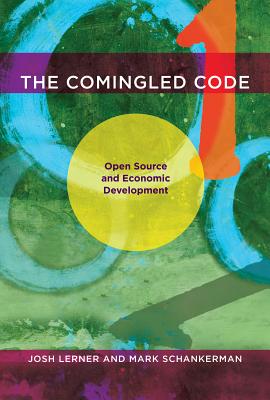

 MIT Press
MIT Press
The Comingled Code: Open Source and Economic Development


Key Metrics
- Josh Lerner
- MIT Press
- Hardcover
- 9780262014632
- 9.06 X 6.26 X 0.77 inches
- 1.08 pounds
- Business & Economics > Industries - Computers & Information Technology
- English
 Secure Transaction
Secure TransactionBook Description
The interaction of open source and proprietary software and the implications for economic development.
Discussions of the economic impact of open source software often generate more heat than light. Advocates passionately assert the benefits of open source while critics decry its effects. Missing from the debate is rigorous economic analysis and systematic economic evidence of the impact of open source on consumers, firms, and economic development in general. This book fills that gap.
In The Comingled Code, Josh Lerner and Mark Schankerman, drawing on a new, large-scale database, show that open source and proprietary software interact in sometimes unexpected ways, and discuss the policy implications of these findings.
The new data (from a range of countries in varying stages of development) documents the mixing of open source and proprietary software: firms sell proprietary software while contributing to open source, and users extensively mix and match the two. Lerner and Schankerman examine the ways in which software differs from other technologies in promoting economic development, what motivates individuals and firms to contribute to open source projects, how developers and users view the trade-offs between the two kinds of software, and how government policies can ensure that open source competes effectively with proprietary software and contributes to economic development.
Author Bio
Josh Lerner graduated from Yale College with a special divisional major. He worked for several years on issues concerning technological innovation and public policy at the Brookings Institution, for a public-private task force in Chicago, and on Capitol Hill. He then earned a Ph.D. from Harvard's Economics Department.
Much of his research focuses on venture capital and private equity organizations. (This research is summarized in Boulevard of Broken Dreams, The Money of Invention, Patent Capital, and The Venture Capital Cycle.) He also examines policies on innovation and how they impact firm strategies. (That research is discussed in the books The Architecture of Innovation, The Comingled Code, and Innovation and Its Discontents.) He co-directs the National Bureau of Economic Research’s Productivity, Innovation, and Entrepreneurship Program and serves as co-editor of their publication, Innovation Policy and the Economy. He founded and runs the Private Capital Research Institute, a nonprofit devoted to encouraging access to data and research, and has been a frequent leader of and participant in the World Economic Forum projects and events.
In the 1993-1994 academic year, he introduced an elective course for second-year MBAs. Over the past two decades, “Venture Capital and Private Equity” has consistently been one of the largest elective courses at Harvard Business School. (The course materials are collected in Venture Capital and Private Equity: A Casebook, now in its fifth edition, and the textbook Venture Capital, Private Equity, and the Financing of Entrepreneurship.) He also established and teaches doctoral courses on entrepreneurship, teaches in the Owners-Presidents-Managers Program, and leads executive courses on private equity. He is the Jacob H. Schiff Professor.
Among other recognitions, he is the winner of the Swedish government’s Global Entrepreneurship Research Award and Cheng Siwei Award for Venture Capital Research. For information on Josh’s compensated outside activities, please see www.bella-pm.com.
Source: Harvard Business School
Videos
No Videos
Community reviews
Write a ReviewNo Community reviews